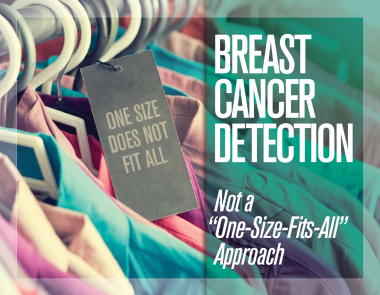Study examines biomarkers for early breast cancers
Aug 19, 2016 | CAP Today
Aug. 19, 2016 (CAP Today)—Provista Diagnostics said a study it conducted, published in PLoS One, shows that a combined assessment of multiple types of protein biomarkers in the blood offers an important advancement for detecting early breast cancer. The study compared the ability of serum protein biomarkers (SPBs) and tumor-associated autoantibodies (TAAbs), either alone or in combination, to detect breast cancer (Henderson MC, et al. PLoS One. 2016;11[8]:e0157692. doi:10.1371/journal.pone.0157692).
The retrospective study evaluated 210 samples collected prior to biopsy. Samples from a single site (Mercy Women’s Center, which was renamed Mercy Breast Center in June 2016) were used, including specimens from 18 participants with no evidence of breast disease, 92 participants diagnosed with benign breast disease, and 100 participants diagnosed with breast cancer (both invasive breast cancer and ductal carcinoma in situ).
Study results show that when SPB data were used independently, clinical sensitivity and specificity for detection of breast cancer were 74.7 percent and 77 percent respectively. When TAAb data were independently used, clinical sensitivity and specificity for detection of breast cancer were 72.2 percent and 70.8 percent respectively. However, when TAAb and SPB data were used together, clinical sensitivity and specificity for detection of breast cancer improved to 81 percent and 78.8 percent respectively.
“The study contributes critical understanding about the sensitivity and specificity advantage gained by integrating SPBs and TAAbs, to accurately detect breast cancer,” Provista Diagnostics president and CEO David E. Reese, PhD, said in a statement. The study is part of the broader pipeline of research studies slated for publication in 2016, exploring the use of SPBs and TAAbs in Provista’s blood-based diagnostic test, Videssa Breast.
Dr. Reese said the study’s data suggest a role of protein biomarkers in addressing the diagnostic challenges associated with imaging, particularly for women whose imaging results fall into category three (probably benign finding), category four (suspicious finding) on the American College of Radiology’s Breast Imaging-Reporting and Data System scale. When women present with abnormal mammography results or have dense breasts, clinicians and patients often face a difficult decision whether to proceed with additional imaging or biopsy.
http://www.captodayonline.com/study-examines-biomarkers-early-breast-cancers/









